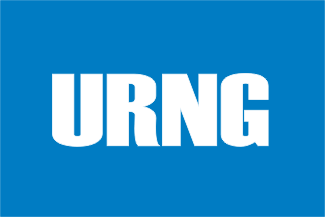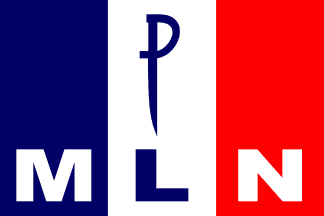
by Jaume Olle', 8 May 2005

Last modified: 2005-08-06 by dov gutterman
Keywords: guatemala | che |
Links: FOTW homepage |
search |
disclaimer and copyright |
write us |
mirrors
See also:
The flag of the Guatemalan National Revolutionary Unity
(Unidad Revolucionaria Nacional Guatemalteca) uses the national
colours. It is a light blue flag (the same shade than the
national flag) with the initials in white.Those coloures are also
used on scarfs, banners, t-shirts, etc.. The logo of the party
contains the initials in blue (on white background) and a panocha
(corncob) of yellow corn with green trunk.
Jaume Olle', 24 March 2002
The factions that made up the URNG were:
- PGT (Partido Guatemalteco del Trabajo, Guatemalan Labor Party)
- FAR (Fuerzas Armadas Rebeldes, Rebel Armed Forces)
- EGP (Ejército Guerrillero de los Pobres,
Guerrilla Army of the Poor)
- ORPA (Organización Pueblo en Armas, Revolutionary Organization
of Armed People).
E. R., 8 May 2005
Guatemalan National Revolutionary Unity (URNG - Unidad
Revolucionaria Nacional Gautemalteca):
Founding Philosophy: The Guatemalan National Revolutionary Unity
(URNG) was an umbrella organization (guerrilla movement) that
emerged in Guatemala in 1982. It represented the principal
leftist organizations, who embodied a mix of insurgent warfare,
terrorism and political activism. The URNG was formed by four
Marxist groups active in Guatemala in the 1970s: the Guerrilla
Army of the Poor (EGP), the Revolutionary Organization of Armed
People (ORPA), the Rebel Armed Forces (FAR), and the Guatemalan
Labor Party (PGT). After the merger, the URNG became the
principal opposition group in the Guatemalan Civil War, which had
pitted right-wing governments, often dominated by the military,
against a number of left-wing groups. Combatants in the civil war
also included right-wing paramilitary groups, sometimes known as
"death squads."
Despite the official merger of the three groups into the URNG,
each maintained its own leadership structure; terrorist attacks
were claimed most often under the name of the individual group,
not as the URNG.
Current Goals: The Guatemalan Civil War ended in 1996. Since
then, after a peace process brokered by the United Nations it
laid down its arms in 1996 and became a legitimate political
party in 1998. It now operates as a peaceful political party.
Sources: <en.wikipedia.org>,
<www.tkb.org>.
E. R., 6 July 2005
Variant
There is also a white flag with the logo.
Jaume Ollé, 27 March 2005
Emblem
1.jpg)
from <en.wikipedia.org>
2.jpg)
from <en.wikipedia.org>
3.jpg)
from <en.wikipedia.org>

by Jorge Candeias, 7 January 2000
Image based on <www.wepa.com.gt/mln>
reported by Christopher Dent. The party is called Movimiento
de Liberación Nacional (Movement of National Liberation)
and, assuming it's flag is as represented in the symbol, it is a
vertical tricolour of blue, white and red, charged with a blue
dagger or sword in the white band and the initials along the
bottom, each letter in it's band and with contrasting colours.
Meaning that the M and the N are white and the L is blue.
Jorge Candeias, 7 January 2000
There is a photo at <story.news.yahoo.com>
with the inscription: "Relatives and supporters of former
Guatemalan Vice President Mario Sandoval Alarcon carry his coffin
along with a flag of the National Liberation Movement during the
funeral service at the general cemetery in Guatemala City on
Friday, April 18, 2003. Sandoval, who served as vice president
between 1974 and 1978 in the government of Gen. Kjell Laugerud,
died Thursday at the age of 79. (AP Photo/Jesus Alfonso)".
Zach Harden, 19 April 2003
If I recall correctly a similar design to the above with
different inscription was used by one of the guerrilla movements
in Guatemala.
Jaume Olle', 3 August 1998
The image is most likely the flag of the EGP (Ejército
Guerrillero de los Pobres, Guerrilla Army of the Poor) which
depicts a face of Ernesto Guevara de la Serna, a. "El
Ché".
E. R., 8 May 2005